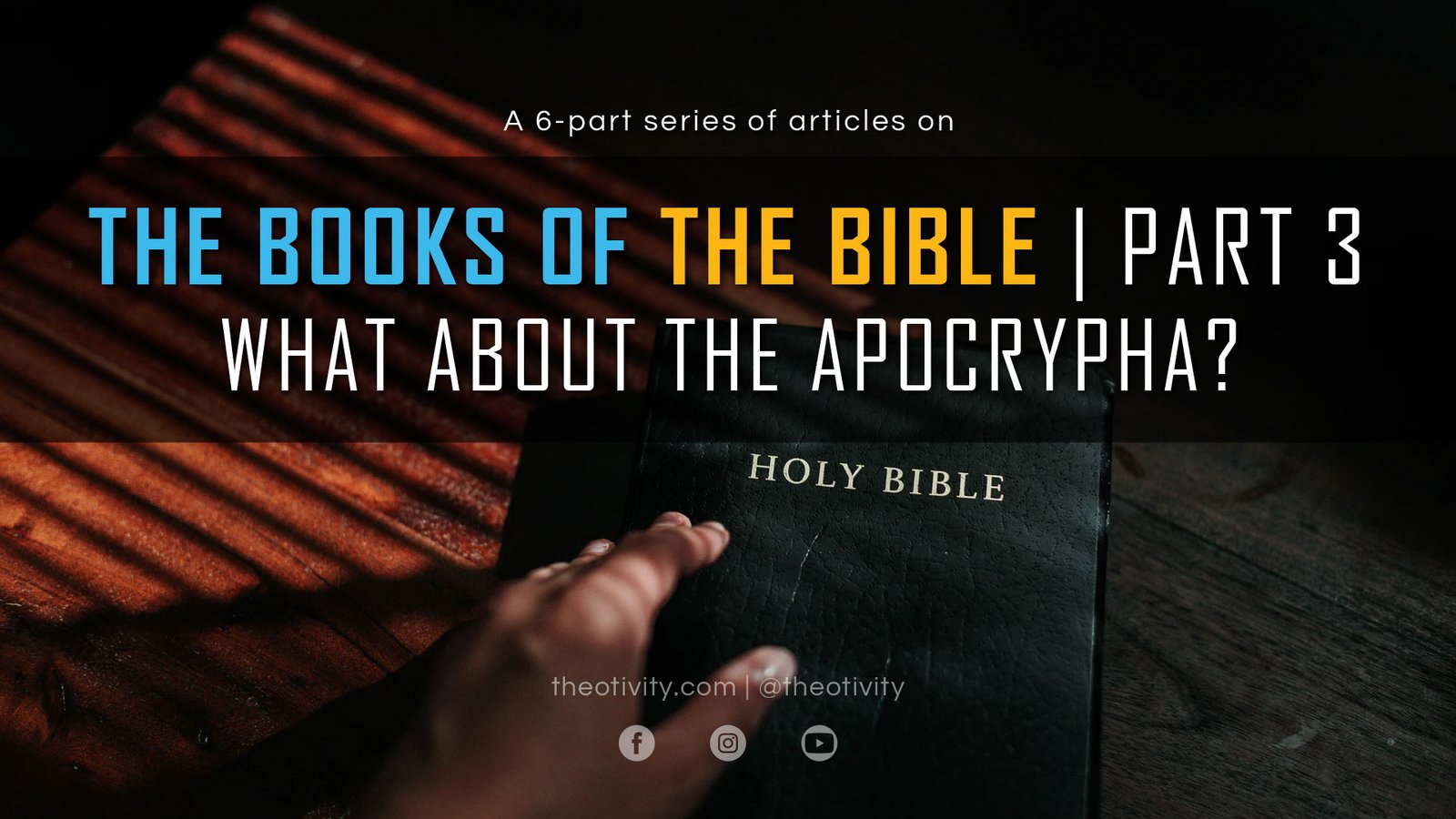In our first article in this series, we looked at what is meant by the ‘canon’ of Scripture – the collection of authoritative, divinely inspired books. In our second article, we looked at the formation of the Old Testament canon. But why is it that Roman Catholic Bibles have extra books in them? The question of whether or not we should recognize the Apocrypha as Scripture is an important one of which many Protestants are unaware and unprepared to give an answer. So, in this article in our series, we will take a look at the reasons why we as Protestants reject the books of the Apocrypha as Divinely inspired Scripture.
The Roman Catholic Bible, while it has the same New Testament (NT) books as the Protestant Bible, contains extra Old Testament (OT) books called the Apocrypha (Apocrypha simply means “hidden”). These books are also called the “Deuterocanonical books” (“Deutero” = second, so this term refers to a second or secondary canon of books). Some of these books contain teachings that contradict the Protestant understanding of the Christian faith.
The Apocrypha includes seven extra books: Tobit, Judith, Wisdom, Ecclesiasticus (not to be confused with Ecclesiastes), Baruch and 1 & 2 Maccabees, as well as additional sections to the books of Esther and Daniel. These extra books contained Jewish stories of their history as well as some other Jewish religious writings. However, these books were never embraced as divinely authoritative by the Jews. So, why are they in Roman Catholic Bibles today?
A Story of Conquests and Translations
How did the Apocryphal books get into the Roman Catholic Bible?
To understand this question, we must know a little bit of the history behind the Apocrypha.
After the conquests of Alexander the Great, the common language of the Greek empire which later became the Roman empire was Greek. Thus, by the time of the New Testament, most Jews living in the area were more fluent in Greek than in Hebrew. So, the Hebrew scriptures were translated into Greek in a translation known as the Septuagint (Septuagint means 70 and is sometimes represented as LXX – which is the Roman numerals for seventy). The name Septuagint comes from a legend that the Hebrew Torah was translated into Greek by 72 Jewish scholars: six scholars from each of the Twelve Tribes of Israel, who independently produced identical translations. Along with the inspired Hebrew books of the Old Testament, the writings of the Apocrypha were also translated into Greek and kept alongside but distinct from the Old Testament books.
The Shift to Latin

At the time of Jesus and the apostles, the common language was still Greek – which is why the New Testament was written in Koine (common) Greek. However, at the beginning of the second century after Christ, the language most widely spoken around the Roman empire had shifted from Greek to Latin. So, there was a need to translate the scriptures into the common language of the people.
“Beginning in the second century after Christ, a Latin translation of the entire Bible was undertaken, reflecting the shift from Greek to Latin as the universal language of the Roman Empire. The version of the Old Testament originally translated was the Septuagint, not the Hebrew Bible. As the church began to adopt Latin as its language, the Latin translation including the Apocrypha became its Bible.” (Gregg R. Allison, Historical Theology, 48)
Thus, the Apocryphal books came into the Bible through the Latin translation of the Bible called the Vulgate (vulgate means common).
Jerome (c. 347 – 420 AD)
The person who did the translation into Latin is Jerome (c. 347 – 420 AD). When Jerome was translating Samuel and Kings, in the preface to these books he wrote a list of canonical Scripture which only included the writings of the Hebrew Bible (the same books we have in our Protestant canon). He considered these alone to be Scripture.
“Elsewhere, Jerome indicated his rejection of Baruch, and though he did translate the additional stories in Daniel of the LXX, he placed them in an appendix to the book. Thus, he relegated the Apocrypha to secondary status in comparison with canonical Scripture.” (Gregg R. Allison, Historical Theology, 48–49)
Commenting on the use of the Apocryphal books, Jerome himself said:
“As then the church reads Judith, Tobit, and the books of Maccabees, but does not admit them among the canonical Scriptures, so let it read these two volumes for the edification of the people, not to give authority to doctrines of the church.”

Jerome himself – the author of the Latin Vulgate – considered that the Apocryphal books may be of some use, but they were not divinely authoritative for the establishment of church doctrine.
So why did Jerome include the Apocryphal writings in his Latin Vulgate translation? It was at the request of Augustine, who was the bishop of Hippo, that he translated from the Greek Septuagint, which included the Apocryphal writings, instead of from the Hebrew Scriptures.
“Unlike Jerome, Augustine could not read Hebrew—he was not overly skilled in Greek either—and he mistakenly thought the Jews had likewise embraced those books as canonical.” (James R. White, Scripture Alone, 115–116)
For over a thousand years after this, the Latin Vulgate including the writings of the Apocrypha would be used as the Bible in churches until the Protestant Reformation in the 16th century. During the Reformation, the motto “ad fontes” – meaning “back to the sources” – drove the Reformers to go back to the original Hebrew texts of the Old Testament and realize that the Apocryphal writings were not originally part of the OT. The Reformers realized that the translator of the Latin Vulgate had himself recognized this distinction.
The Reformation & the Vulgate
During the Reformation, the Protestant Reformers critiqued the use of the Apocrypha in the church for three main reasons:
I. The Development of Unbiblical Practices
The Roman Catholic medieval church had developed beliefs and practices based on the Vulgate translation. For example, a classic proof text used for the belief in purgatory, indulgences and the practice of praying for the dead was from an account of Judas Maccabaeus in 2 Maccabees 12:38–45.
II. Poor Translation of Certain Passages
They also realized that the Latin Vulgate was a poor translation of the Greek New Testament in certain places. This was important in several key passages where Roman Catholic beliefs were skewed because of the Latin version. One example is that of the translation of the original Greek command metanoieite, normally translated as “repent”:
“…the Vulgate version of Jesus’ evangelistic preaching (Matt. 4:17) had “do penance.” This command of the Lord was used as the biblical foundation of the church’s sacrament of penance, a means of receiving God’s grace after sinning by praying, giving to the poor, forgoing certain physical pleasures, and so forth.” (Gregg R. Allison, Historical Theology, 50–51)
One can understand how hearing Jesus preach “do penance for the Kingdom of God is near” instead of “repent for the Kingdom of God is near” could skew one’s view of the Gospel.
III. Inconsistency within Roman Catholicism over the Apocrypha
Historically, there has not been consistency in Roman Catholicism over the books of the Apocrypha, although modern Catholic Apologists will claim that this has been the unchanging teaching of the Church. For example, even Pope Gregory the Great (c.590-604 AD) had rejected Maccabees as “not canonical” , citing an incident from 1 Maccabees 6:46. The New Catholic Encyclopedia confirms pope Gregory’s rejection of Maccabees as Scripture.
“…even Cardinal Ximenes, in his introduction to the first printed edition of the Greek New Testament, presented the same rejection of full canonical status to the apocrypha that Cardinal Cajetan documented, and yet Pope Leo X still approved the publication of the work. It is simply beyond controversy that at the beginning of the Reformation, the dogmatic stance taken at the Council of Trent was not the view of the best read and scholarly Roman Catholic leaders of the communion.” (James R. White, Scripture Alone, 115)

Furthermore, in the Councils of Carthage in the 3rd to 5th centuries, they used the Greek Septuagint – containing 1 and 2 Esdras. However, the Council of Trent in the 16th century used the Latin Vulgate which didn’t include those additions and definitively removed the material of 1 Esdras. The material of Carthage’s canon was included in papal decrees of Pope Innocent I, Gelasius, and Hormisdas. So, how could the Council of Trent (1546) declare non-canonical what popes a thousand years earlier had accepted? This means that if you had followed the Roman bishop’s guidance concerning the canon, you would have embraced non-inspired documents as canonical for more than a thousand years!
The Roman Catholic Response
The Roman Catholic church responded to the Protestant critique of the Vulgate by issuing this warning at the Council of Trent (which still stands today):
“If anyone does not receive, as sacred and canonical, these books, with all their parts, as they have been read in the Catholic Church and as they are contained in the old Latin Vulgate edition, and knowingly and deliberately rejects the above mentioned traditions, let him be anathema [cursed].”
Thus we see that Protestants and Roman Catholics are still separated on this issue of canon. Francis Turretin (1623-1687) is helpful on this point and worth quoting at length. He wrote:
“The Jewish church, to which the oracles of God were committed (Rom. 3:2), never considered them as canonical, but held the same canon with us (as admitted by Josephus, Against Apion)… They are never quoted as canonical by Christ and the apostles like the others. And Christ, by dividing all the books of the Old Testament into three classes (the law, the Psalms and the prophets), clearly approves of the canon of the Jews and excludes from it those books which are not embraced in these classes. The Christian church for four hundred years recognized with us the same and no other canonical books… The authors were neither prophets and inspired men, since they wrote after Malachi (the last of the prophets); nor were their books written in the Hebrew language (as those of the Old Testament), but in Greek. Hence Josephus acknowledges that those things which were written by his people after the time of Artaxerxes were not equally credible and authoritative with those which preceded “on account of there not being an indisputable succession of prophets.” (Francis Turretin, Institutes of Elenctic Theology, Vol. 1, p.102)
Thus, Protestants reject the books of the Apocrypha as divinely inspired. Wayne Grudem concludes that the books of the Apocrypha should not be regarded as Scripture because:
- They do not claim for themselves the same kind of authority as the Old Testament writings
- They were not regarded as God’s words by the Jewish people from whom they originated
- They were not considered to be Scripture by Jesus or the New Testament authors;
- They contain teachings inconsistent with the rest of the Bible.
Therefore, the Apocryphal books are not God-breathed words like the words of Scripture. They do, however, have some value for historical information, and they contain a number of helpful historical stories about the courage and faith of many Jews during the intertestamental period. One should not be afraid to read them for oneself – just know that they are not Scripture, but may have helpful insights into the intertestamental period between the Old and New Testaments.
This concludes this third article in this series. In our next article, we will take a look at the books of the New Testament and why it is that more books were added to the collection of divinely authoritative writings after more than 400 years of silence after the close of the Old Testament.
Articles in this series:
- What is the Canon of Scripture? | (Part 1)
- Why were the Books of the Bible collected together? | (Part 2)
- What about the Apocrypha? | (Part 3)
- Why were the New Testament Books added to the Bible? | (Part 4)
- How do we Recognize the Books that are Scripture? | (Part 5)
- Is the Bible missing any books today? | (Part 6)
If you’ve enjoyed this article, please like, comment, share and follow to stay updated on future articles and resources from Theotivity.



